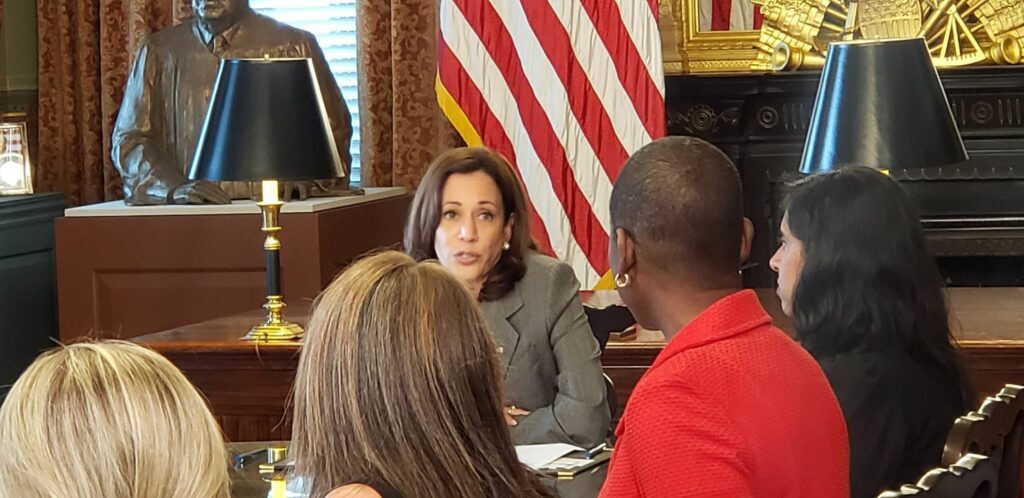
*American women could soon find out what life will be like with the termination of access to legal abortions. In light of a leaked Supreme Court draft decision on Roe Vs. Wade, it is expected that the abortion law will be jeopardized with subsequent detrimental ramifications for other personal and health-related rights that Americans have a choice to exercise every day.
Last week, Vice Pres. Kamala Harris convened constitutional law professors, privacy, and technology experts, and women’s issues experts to examine the implications of Roe being overturned. Harris said she is concerned that not only will the right to a legal abortion be impacted by the foreboding decision, but also that the right to use any form of contraception will be stripped away.
In anticipation of the vote on Roe, which could happen this month, she said she wants people to be prepared.
“I do believe that we should prepare for the right to privacy to be attacked and under attack with this decision, and that will have a number of implications. If Roe is overturned, I believe that states will then have the power to interfere in personal decisions,” she said.
MORE NEWS ON EURWEB: Whoopi Goldberg Reacts to Abortion Debate: ‘This Is My Body’ | VIDEO
The Guttmacher Insitute indicated that 26 states are likely to or certain to ban abortion if Roe is reversed. Thirteen states that are mostly in the rips of religious conservatives have trigger laws that would ban abortion. The state of Louisiana has a bill on the table that would consider abortion as murder, therefore criminalizing the act.
When the draft document was first leaked the vice president said in a statement, “The rights of all Americans are at risk. If the right to privacy is weakened, every person could face a future in which the government can potentially interfere in the personal decisions you make about your life. This is the time to fight for women and for our country with everything we have.”
VICE PRESIDENT KAMALA HARRIS IDENTIFIES THREE AREAS OF IMPACT ON ABORTION
Vice Pres. Harris shared that the group would cover three main areas of impact after the law changes namely privacy, contraception, and in vitro fertilization. Her verbatim remarks follow:
Data Privacy
“One is the issue of data privacy and the potential that if Roe is overturned, states that have criminalized abortion could subpoena a woman’s personal data. And so, I’m — I want to talk to these experts about their concern and the level of their concern about that very issue, including, for example, the vulnerability of women who are using menstrual tracking apps; those who use a search engine to find certain locations or certain help, in terms of their reproductive health, and how vulnerable those searches will be to bad actors attempting to track their history, much less any government forces that may be interested in investigating that for whatever purpose.”
In Vitro Fertilization Availability
“The issue of IVF — in vitro fertilization. I have a concern that if Roe is overturned, states with abortion bans could potentially restrict IVF if their definition of life begins at the point of fertilization. So I’d like to talk with these experts about their thoughts about that and whether the law is established or not — well established or not, in terms of the protection that individuals have if they are in the process of IVF.”
Contraception
If Roe is overturned, we believe that states with abortion bans from the moment of fertilization could potentially restrict specific types of contraception — in particular, IUDs and the so-called morning-after pill. And so, I’d like to talk with these experts about their thoughts, in terms of the legal theories that would be at play if that were to take place.
Participants at the table:
– Professor Melissa Murray of NYU School of Law
– Professor Glenn Cohen of Harvard Law School
– Professor Michele Bratcher Goodwin of UC Irvine School of Law
– Jennifer Weiss-Wolf of Brennan Center for Justice and Ms. Magazine
– Professor Leah Litman of the University of Michigan Law School
– Professor Peggy Cooper Davis of NYU School of Law (participating via Zoom)
The abortion decision is anticipated this summer.
We Publish News 24/7. Don’t Miss A Story. Click HERE to SUBSCRIBE to Our Newsletter Now!





